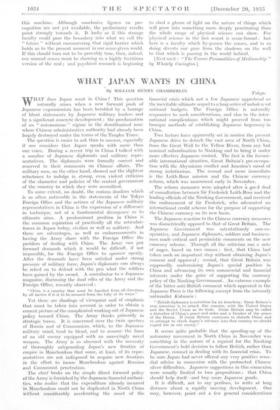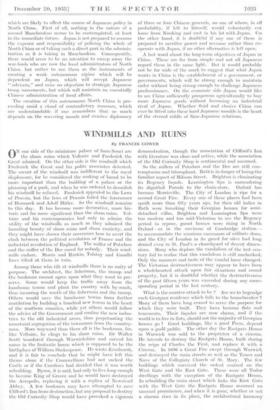WHAT JAPAN WANTS IN CHINA
By WILLIAM HENRY CHAMBERLIN
WHAT does Japan want in China? This question naturally arises when a new forward push of Japanese expansionism has been heralded by a barrage of blunt statements by Japanese military leaders and by a significant concrete development : the proclamation of an " autonomous " regime in the demilitarised zone where Chinese administrative authority had already been largely destroyed under the terms of the Tangku Truce.
The question is easier to ask than to answer, especially if one considers that Japan speaks with more than one voice. During a recent trip in China I talked with a number of Japanese diplomats and military repre- sentatives. The diplomats were formally correct and .reserved in their comments on Chinese affairs. The military men, on the other hand, showed not the slightest reluctance to indulge in strong, even violent criticism of the character and policies of the central government of the country to which they were accredited. To some extent, no doubt, the curious dualism which is so often noticeable in the statements of the Tokyo Foreign Office and the actions of the Japanese military representatives in China is the expression of a difference in technique, not of a fundamental divergence as to ultimate aims. A predominant position in China is the common aspiration of practically all the articulate forces in Japan today, civilian as well as military. And there are advantages, as well as embarrassments in having the Army share with the Foreign Office the problem of dealing with China. The Army can put forward demands which it would be difficult, if not impossible, for the .Foreign Office to sponsor openly. After the demands have been satisfied under strong pressure of military force, Japan's diplomats can always be relied on to defend with the pen what the soldiers have gained by the sword. A contributor to a Japanese magazine, discussing the dual rules of the Army and the Foreign Office, recently observed :
" China is a country that must be handled from all directions by all tactics if it is to be aroused from the folly of its ways."
Yet there are shadings of viewpoint and of emphasis that must be taken into account in order to obtain a correct picture of the complicated working out of Japanese policy toward China. The Army thinks primarily in strategic terms. It is concerned over the twin spectres of Russia and of Communism, which, to the Japanese military mind, tend to blend, and to assume the forria of an old enemy equipped with an annoyingly novel weapon. The Army is so obsessed with the necessity of thoroughly safeguarding Japan's new frontier of empire in Manchoukuo that some, at least, of its repre- sentatives are not indisposed to acquire new frontiers in the effort to insure Manchoukuo against Russian and Communist penetration.
The chief brake on the simple direct forward policy of the Army is furnished by the Japanese financial authori- ties, who realise that the expenditure already incurred in Manchouktio could not be duplicated in North China without considerably accelerating the onset of the Tokyo. financial crisis which not a few Japanese apprehend as the inevitable ultimate sequel to a long series of unbalunTed national budgets. The Foreign Office is naturally responsive to such considerations, and also, to, the inter- national complications which might proceed from too brusque methods of establishing Japanese hegemony in China.
Two factors have apparently set in motion the present Japanese drive to detach the vast area of North China, from the Great Wall to the Yellow River, from any but nominal subordination to Nanking and to bring it under more effective Japanese control. The first 'is the favour- able international situation, Great Britain's pre-occupa- tion with the Abyssinian conflict and America's mood of strong isolationism. The second and more immediate is the Leith-Ross mission and the Chinese currency reform, which was announced early in November.
The reform measures were adopted after a gocd deal of consultation between Sir Frederick Leith-Ross and the leading officials of the Nanking Government, and received the endorsement of Sir Frederick, who advocated an international credit scheme for the purpose of supporting the Chinese currency on its new basis.
The Japanese reaction to the Chinese currency measures was diametrically opposed to that of Great Britain. The Japanese Government was ostentatiously non-co- operative, and Japanese diplomats, soldiers and business- men made critical and pessimistic comments on the new currency scheme. Through all the criticism ran a note of anger, based on two causes : first, that China had taken such an important step without obtaining Japan's consent and approval ; second, that Great Britain was supposedly undermining Japan's special position in China and advancing its own commercial and financial interests under the guise of supporting the currency policy of the Nanking Government. An extreme example of the bitter anti-British comment which appeared in the Japanese Press is the following excerpt from the intensely nationalist Kokumin :
" British diplomacy is notorious for its treachery. Groat Britain's true intention is to attack this country, with the United States and the Soviet Union as its tools. Groat Britain may be called a disturber of China's peace and order and a breaker of the peace of the Orient. If Groat Britain continues to disturb China and to attempt to check Japan's advance into that country wo should regard her as our enemy."
It seems quite probable that the speeding-up of the autonomy movement in North China in November was something in the nature of a reprisal for the Nanking Government's bold decision to follow British, rather than Japanese, counsel in dealing with its financial crisis. To be sure Japan had never offered any very positive reme- dial advice in , connexion with the protracted Chinese silver difficulties. Japanese suggestions in this connexion were usually limited to two propositions : that China should help itself and buy more Japanese goods.
It is difficult, not to say perilous, to write at long distance about a rapidly moving development. One may, however, point out a few general considerations which are likely to affect the course of Japanese policy in • North China. First of all, nothing in the nature of a second Manchoukuo seems to be contemplated; at least in the immediate future. Japan is not prepared to assume the expense and responsibility of policing the whole of North China or of taking such a direct part in the adminis- tration as it is taking in Manchoukuo. Consequently, there would seem to be no intention to sweep away the war-lords who are • now the local administrators of North China, but rather to use them as the instruments of creating a weak autonomous regime which will be dependent on Japan, which will accept Japanese " advisers," and raise no objection to strategic Japanese troop movements, but which will maintain an essentially Chinese administration of local affairs.
• The creation of this autonomous North China is pro- ceeding amid a cloud of contradictory rumours, which are understandable if one remembers that so much depends on the wavering moods and evasive diplomacy of three or four Chinese generals, no one of whom, in all probability, if left to himself, would voluntarily cut loose from Nanking and cast in his lot with Japan. On the other hand, it is doubtful if any one of them is prepared to sacrifice power and revenue rather than co- operate with Japan, if no other alternative is left open.
A last word about the long-term objectives of Japan in China. These are far from simple and not all Japanese regard them in the same light. But it would probably not be far wide of the mark to suggest that what Japan wants in China is the establishment of a government, or governments, which will be strong enough to maintain order without being strong enough to challenge Japanese predominance. On the economic side Japan would like to see China sufficiently prosperous agriculturally to buy more Japanese goods without becoming an industrial rival of Japan. Whether fluid and elusive China can ever be fitted into these hard Japanese moulds is the heart of the eternal riddle of Sino-Japanese relations.











































 Previous page
Previous page